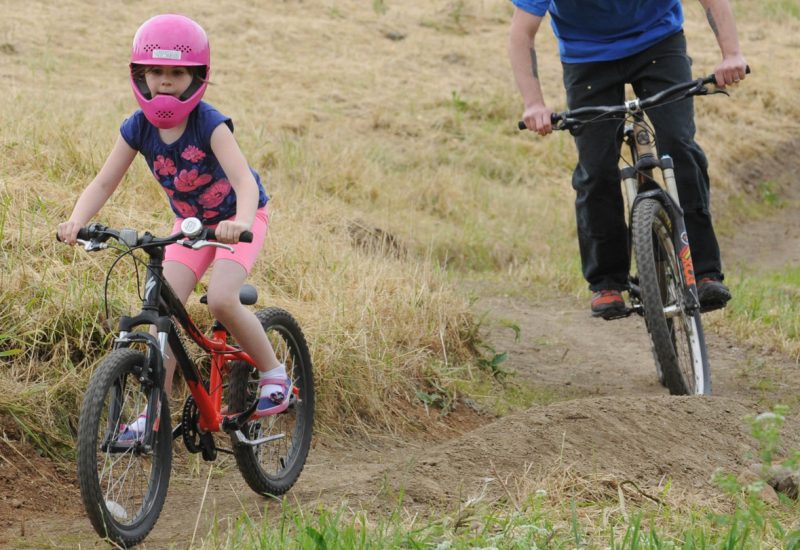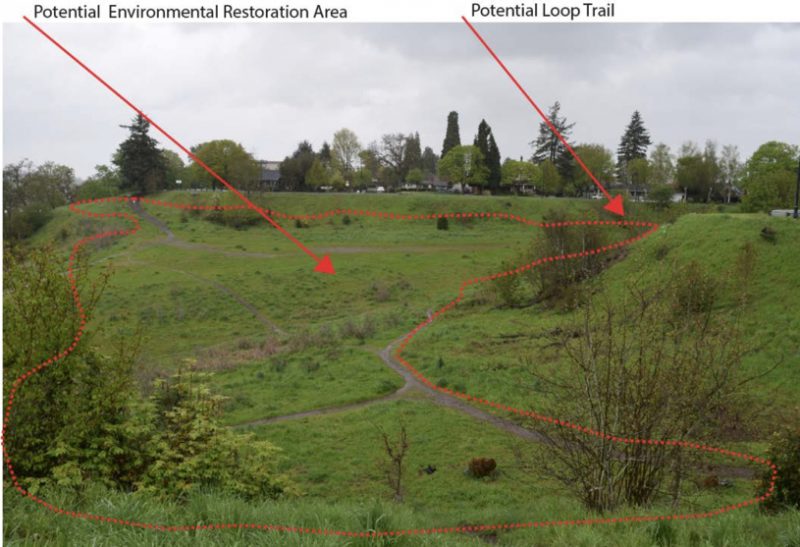
(Photo: J. Maus/BikePortland)
As Portland’s Off-road Cycling Master Plan (ORCMP) rolls ever closer to its big date at City Council, interest groups throughout the city are taking notice.
The usual opposition to better bike access on dirt trails in Portland is very well-known. But I’ve noticed something new in the past few weeks: Advocates for local parks who oppose parts of it based on fears that anything that attracts more off-road bikers will negatively impact the park and its current users.
I find this reflexive opposition very unfortunate.
“There are real potential conflicts with off road cycling mingling with other users of the Park… I do not have faith that off road cyclists will remain in a designated area.”
— Kelly Pergande, Friends of Pier Park
Take the Dog Bowl (along Willamette Blvd above Swan Island) and Pier Park (in St. Johns) for instance. Both locations are included in the plan as possible sites for upgraded and/or new trails in the future.
On the four acres of Dog Bowl, the Bureau of Planning and Sustainability thinks it might be possible to build a “sustainable loop trail” along the edge of the property.
At the much larger, 87-acre Pier Park, the plan says there’s room for a “medium-sized bicycle park” (about one acre) near the existing skate park, a “natural surface loop trail for family-friendly cycling, walking, running and enjoyment of nature” and some “skill features” like rocks, logs or bridges interspersed along the edges.
These are extremely minimal proposals that are nothing more than placeholders at this stage. The plan makes it clear: both sites would have to go through master plans and a community input process before anything would change.
Nevertheless, advocates for the parks have expressed opposition.
Overlook Neighborhood Association Chair Chris Trejbal wrote a letter to the Portland Parks Board on March 23rd. “The ‘potential loop trail’ shown in the Draft ORCMP,” he wrote, “would preclude the lower-impact activities that take place there now.” Here’s more from his letter:
“Contrary to the draft’s vision, the usable area of the 4-acre site could not be divided in a way that would accommodate those uses as well as off-road biking. A large portion of the Dog Bowl is steep, landslide-prone hillside and a special habitat oak woodland. The remainder is not sufficient to accommodate off-road biking and other uses without immediately generating conflicts.
The Draft ORCMP was developed without community input from the Overlook neighborhood and the dozens of people who use the Dog Bowl daily. We recognize the need for infrastructure to support the city’s off-road biking enthusiasts, but the Dog Bowl is not a suitable site.”
Advertisement

I emailed Trejbal to ask why he assumed off-road biking at Dog Bowl would lead to conflicts and why he thought it would preclude people from doing what they do there now.
Trejbal said he feels an improved trail would leave, “Very little space for the historic uses of the property.” He feels that, “Dogs running around and trail biking are a combination that is certain to lead to negative interactions when a dog chases a biker or a biker hits a dog. Likewise, walkers, runners, kids or people eating lunch are not a good fit crossing and immediately next to off-road cycling.”
“The question, then,” he continued, “is whether the Dog Bowl should continue to fill its role as a small neighborhood open space with diverse uses or should it be handed over to a single activity that would be incompatible with dogs and kids running around. As a neighborhood, we favor the former.”
Trejbal would rather put the activity somewhere else: “I have nothing against setting aside space in Forest Park for off-road cycling.” (Of course people who oppose off-road cycling in Forest Park are a big reason the City is looking at places like Dog Bowl.)
Again. There’s nothing in the plan that should lead someone to believe that Dog Bowl will be “handed over” to cycling.
A similar reaction comes from advocates of Pier Park.
At that location, BPS has also proposed very minimal, early-stage concepts where nothing would happen without a full master planning process.
Yet Friends of Pier Park’s Vice Chair Kelly Pergande and Chair Matt Kuntz oppose it.
In a response to the City of Portland posted on their website, Pergande writes,
“There are real potential conflicts with off road cycling mingling with other users of the Park… I do not have faith that off road cyclists will remain in a designated area. It is inevitable that there will be off road cycling throughout the park… Preserving the ability to utilize the pathways for pedestrians and current cyclists without adding off road to the mix, will be even more important as the population increases in our city.”
And Chair Matt Kuntz writes:
“We do not feel that PP&R Recommendation #3 (‘natural surface loop family friendly trail…inside park’) could be feasibly designed without drastically reducing safety and usability for other park users. The current family friendly path (paved & mixed-gravel) that exists today is heavily used by walkers, joggers, strollers, kids, dogs, bird-watchers, and slow moving bicycles. Any sanctioned off-road bike course or track would add speed and unrestrained bike riding styles into the equation that would be unfit to mix into a family friendly path. Course features mentioned such as “rocks, logs or bridges” would have these higher speed bikes moving back off-and-on to the trail which would be unpredictable for regular traffic flow. Our regular path users would not want to use such a trail.”
Kutnz also thinks any new trails in the park, “Would lead to biodiversity and habitat loss in the Park, which we firmly oppose.”
Similar to Trejbal, Kuntz and Pergande assume a worst-case scenario if anything is done to improve off-road bicycling in these parks. They assume people who ride these bikes will be inconsiderate and rude and won’t follow the rules. They assume danger and conflict and a loss of access. They assume if the experience of the park for one type of user is improved, the experience for others will automatically get worse.
That’s not how I see it. We can all gain something as we grow and change. But we’ll never find out what that is if we aren’t willing to let it happen.
— Jonathan Maus: (503) 706-8804, @jonathan_maus on Twitter and jonathan@bikeportland.org
Never miss a story. Sign-up for the daily BP Headlines email.
BikePortland needs your support.

